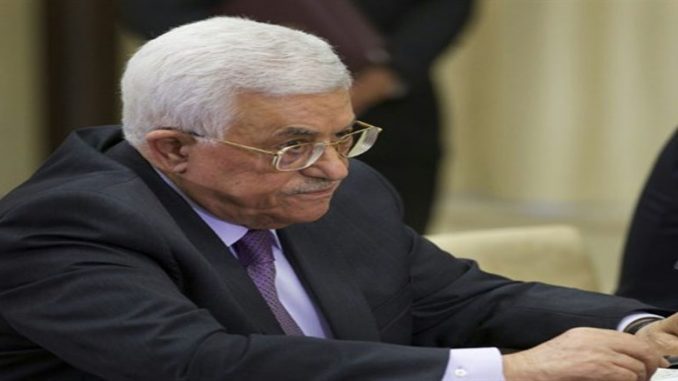
Palestinian President Mahmoud Abbas warned on Wednesday evening the Israeli government’s plans to build 2,500 housing units in illegal settlements in the occupied West Bankwould have “major and dangerous consequences.”
Israeli Prime Minister Benjamin Netanyahu and Defense Minister Avigdor Lieberman approved plans for the construction on Tuesday, with Israeli newspaper Haaretz quoting Lieberman as saying that “we are returning to life as normal in Judea and Samaria,” using an Israeli term for the occupied Palestinian territory.
The move came only two days after Netanyahu pledged to lift all restrictions on settlement construction in occupied East Jerusalem and to advance settlement expansion in the West Bank.
Israel’s Jerusalem municipality also approved permits for the construction of at least 566 new illegal Israeli settlement units in occupied East Jerusalem on Sunday.
During the opening session of the Fatah Revolutionary Council in Ramallah, Abbas said that discussions were underway with Arab leaders to prevent the latest settlement expansion.
Abbas called the recent United Nations Security Council Resolution 2334, which called on Israel to cease all settlement activities in the occupied Palestinian territory, the most important decision with regard to Israeli settlement activity in 35 years.
“We made important calls and succeeded in holding a session of the UN Security Council and obtain an international decision condemning settlement activity, in spite of all the pressures,” Abbas said.
He added that Palestinian officials were working on obtaining full Palestinian membership to the United Nations in order to better protect and advocate for Palestinian rights.
The settlement construction announcement has sparked a flurry of condemnations, both from Palestinian and foreign officials.
Permanent Observer of Palestine to the United Nations Riyad Mansour lamented on Tuesday the “continuing grave breaches being perpetrated by Israel, the occupying power, in the occupied Palestinian territory, including East Jerusalem, in flagrant contempt for international law and defiance of the international community and with devastating consequences on the two-state solution and the prospect for peace.”
Mansour noted in his statement, addressed to the UN Security Council and General Assembly, that this was the 603rd letter addressed by Palestinian authorities to the United Nations regarding Israeli violations since 2000.
Meanwhile, Palestine Liberation Organization (PLO) Executive Committee member Hanan Ashrawi stated that “once again, the Israeli government has proved that it is more committed to land theft and colonialism than to the two- state solution and the requirements for peace and stability.”
The European Union called the Israeli decision “regrettable,” while British Minister for the Middle East Tobias Ellwood said it was “counterproductive” and undermined the peace process.
A spokesperson of the Ministry of Foreign Affairs of France — which hosted an international summit earlier this month addressing the Israeli-Palestinian conflict — also reacted negatively.
“This…represents, in just a few days, almost as many settlement homes as all those announced in 2016,” spokesman Romain Nadal said. “We condemn these new developments, which are contrary to international law and are a very troubling sign.”
The decisions to expand settlements in the occupied Palestinian territory come as Israeli politicians were reportedly putting such plans on hold until after the inauguration of US President Donald Trump, a vocal supporter of Israel and its settlement expansion, last Friday.
Rights groups have highlighted that each of the some 196 government-approved Israeli settlements scattered across the occupied West Bank and East Jerusalem, as well as the scores of settler outposts deemed illegal by the Israeli government, are all built in direct violation of international law.
While members of the international community have rested the solution to the Israeli-Palestinian conflict on the discontinuation of illegal Israeli settlements and the establishment of a two-state solution, Israeli leaders have instead shifted further to the right.
More than half of the ministers in the current Israeli government have publicly stated their opposition to a Palestinian state and advocated for annexation of the West Bank.
A number of Palestinian activists have criticized the two-state solution as unsustainable and unlikely to bring durable peace, proposing instead a binational state with equal rights for Israelis and Palestinians.
